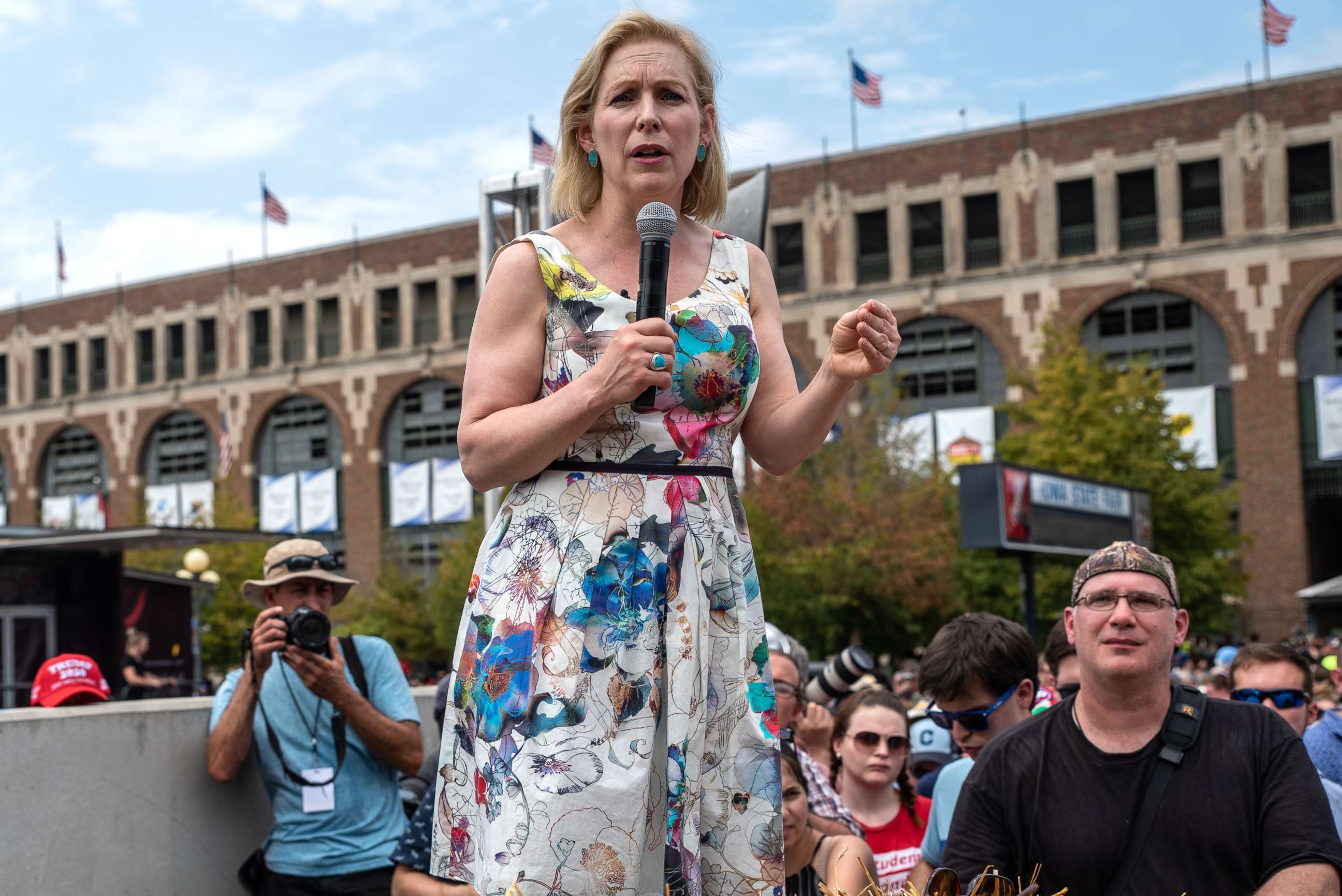Sen. Kirsten Gillibrand chastises Israel over US congresswomen, but doesn't demand consequences
The senator spoke in an interview with Martha Raddatz.
Sen. Kirsten Gillibrand spoke out on ABC’s "This Week" against Israel’s initial decision to deny Reps. Rashida Tlaib and Ilhan Omar the ability to visit the country, but stopped short of saying there should be repercussions.
“I don't know why Netanyahu wanted to deny members of Congress to come to Israel if they expect us to be that never-ending partner and friend," said Gillibrand.
ABC News' Martha Raddatz asked the New York senator, “Should there be repercussions for Israel?”
“I think our obligation, as an ally and as a friend is to hold them accountable when they're wrong. And I think anytime you are undermining basic free speech rights and human rights you're going in the wrong direction,” Gillibrand said in response.
In a wide-ranging interview, Gillibrand also addressed her plan to combat gun violence, including her proposal for a federal assault weapons buyback program.
The senator's remarks follow two high-profile mass shootings earlier this month in El Paso, Texas, and Dayton, Ohio, in which dozens of people were killed.
President Trump has in the past accused Democrats of aiming to take away guns from law-abiding gun owners. Democrats, however, have stood united in the last few weeks in their call for stricter background checks and other safety reforms.
“You want to make it illegal to buy or sell these assault weapons, and as part of your efforts, you would offer money, a buyback,”said Gillibrand. “One of the biggest tools in your toolbox is buyback, because you want to give people the opportunity to be reimbursed for the money that they spent to own those weapons.”

Gillibrand said, if elected, she would ban assault weapons and large magazines. She also called for fingerprint technology to prevent unauthorized users from pulling the trigger on a particular weapon.
"I don't think we should be living in a world where our family can't go to Walmart to go back-to-school shopping," said Gillibrand. "I don't think we want to live in a world where young children are learning shelter-in-place drills, as opposed to math drills, that's the truth of where we are."
Gillibrand was also asked about the state of the economy and rumblings of a possible recession.
“I’m concerned because I think NAFTA 2.0 is a disaster. I think it was a giveaway to drug companies in Mexico. It's going to harm our jobs. President Trump said no bad trade deals, not only has he entered into them, but he started to trade war with China and it’s really harming producers,” said Gillibrand.
The senator has previously been outspoken against President Trump's trade war with China, and has called for holding China accountable for tactics she said undermine American manufacturing.
If elected president, Gillibrand said she would partner with other nations and consider using sanctions to pressure China over growing tensions with protesters in Hong Kong.
Over the weekend, tens of thousands again took the streets in Hong Kong, fighting against a bill that would allow for extradition to mainland China.
“I would back them because they expect a country where they have free speech, they don't expect to be extradited to mainland China,” she said. “They don't expect to be denied the ability to protest or speak for themselves.”
“You just have to use your power and especially your economic power to force different behavior,” said Gillibrand.
Gillibrand is currently on the campaign trail, and trying to drum up support ahead of the Aug. 28 deadline to earn a spot on the next primary debate stage. Gillibrand’s campaign has struggled to gain traction and hasn’t yet met the criteria to qualify.
For the September debate, candidates must receive 2% support or support in at least four national polls, or polls conducted in the early-voting states of Iowa, New Hampshire, South Carolina and/or Nevada, and must have received donations from at least 130,000 unique donors over the course of the election cycle, with a minimum of 400 unique donors per state in at least 20 states. Gillibrand’s campaign said it had reached 100,000 donors, but the New York senator has met the 2% requirement in only one qualifying poll.
When asked on This Week, Gillibrand was adamant that she’d earn a spot on the debate stage.
“I will qualify,” said Gillibrand.




